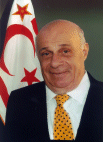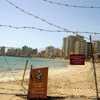EQUAL TREATMENT, BY THE WORLD, OF THE TWO NATIONS IN CYPRUS IS THE KEY TO A PEACEFUL AND LASTING RELATIONSHIP BETWEEN THE TWO PEOPLES OF THE ISLAND.
 By His Excellency, Rauf R. Denktas, President of the Turkish Republic of Northern Cyprus
By His Excellency, Rauf R. Denktas, President of the Turkish Republic of Northern Cyprus
It gives me great pleasure to address the Turkish World from the pages of FOCUS. I congratulate the founders of the World Turkish Congress for this worthwhile publication.
The idea of establishing a medium of communication within this organization is both timely and beneficial.
I am sure that this publication will significantly contribute to the renewed awareness on our part of our common heritage and in informing the world about the affairs of the Turkish World.
In this context, I would like to say a few words about the Cyprus issue which is again under discussion between the two Nations on the Island. The inability to find a diplomatic solution to this long-standing dispute is due to the fact that the cause of the problem has not been correctly diagnosed.
The Cyprus problem arose thirty years ago as a result of a Greek Cypriot attempt to convert by force of arms, a partnership state into a purely Hellenic state.
In the course of this campaign of violence, the Greek Cypriots did not only massacre, abduct and uproot thousands of Turkish-Cypriots but they also ejected them from the entire government apparatus.
That the international community continued to treat the Greek Cypriot side as the “Government of Cyprus”, in spite of the above, has left no incentive to the Greek Cypriots to settle the problem with us on the basis of political equality.
Furthermore, the Greek Cypriots have been enriching themselves economically from the continuation of the status-quo while the Turkish Cypriots are kept under an inhuman embargo.
This in a nutshell is the core of the Cyprus problem and unless a remedy is found to the illegal and immoral monopolization by the Greek Cypriots of the title of “the Government of Cyprus”. The Greek Cypriots will have no incentive to settle a dispute on a just and lasting basis.
The Turkish-Cypriots deserve to be treated as an equal political entity in Cyprus as much as the Greek-Cypriots. They have established their own state nine years ago through the exercise of their right to self determination. A negotiated solution can only be achieved by the recognition of the reality of the existence of two Nations and two States in the island. Equal treatment, by the world, of the two nations in Cyprus is the key to a peaceful and lasting relationship between the two peoples of the island.
FOCUS on the Turkish World, November 1992, the World Turkish Congress




 Entrenched property disputes on ethnically split Cyprus could be resolved if the two sides compromised on new proposals in reunification talks, a report by the International Crisis Group (ICG) think tank said on Thursday.
Entrenched property disputes on ethnically split Cyprus could be resolved if the two sides compromised on new proposals in reunification talks, a report by the International Crisis Group (ICG) think tank said on Thursday.